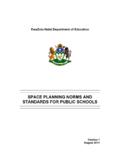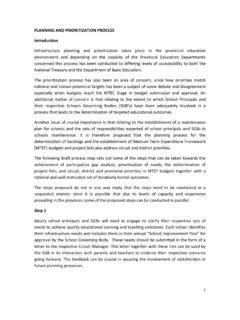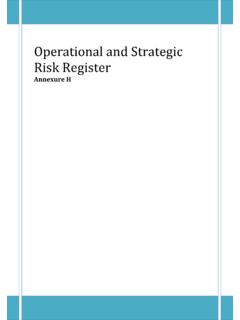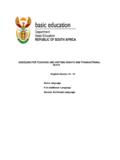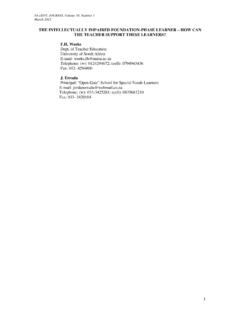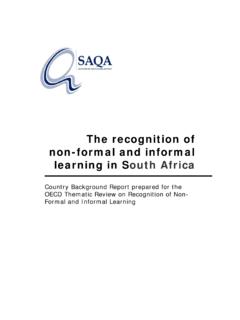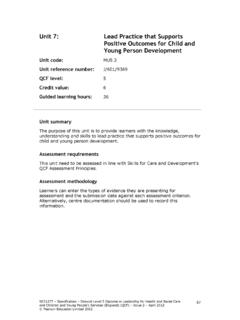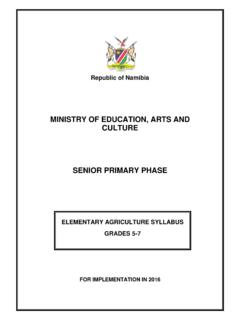Transcription of GUIDELINES FOR CONCESSIONS - KZN Internet
1 GUIDELINES FOR CONCESSIONS INTRODUCTION It is widely acknowledged that assessment practices can become barriers to learning or barriers preventing learners from reaching their full potential. The South African Qualifications Authority Act (SAQA), no. 58 of 1995, states that credibility in assessment is assured through assessment procedures and practices governed by various principles, one of which is the principle of fairness. This principle determines that assessment practices should not in any way hinder or advantage a learner.
2 Inclusivity, as expressed in Education White Paper 6 on Special Needs Education: Building an Inclusive Education and Training System, 2001, heralds a shift away from categorisation or labelling of learners according to disability, towards addressing barriers experienced by individual learners . It should be determined at an early stage what the individual needs are of each learner experiencing barriers to learning , and what levels of support are required in order to ensure the fairness of assessment .
3 learners should become accustomed to the alternative assessment method during internal assessment , so that when they are externally assessed they are able to realise their full potential. At this point one should take cognisance of the sad reality that many of our severely disabled learners may never reach these exit points. However, it is our responsibility to lead them as far on the path of lifelong learning as it is possible. PURPOSE OF THE GUIDELINE These GUIDELINES were drawn with a purpose of making it possible for learners with special educational needs to: Access alternate ways in which to demonstrate whether they have attained knowledge, concepts and skills.
4 Be able to exit school with an appropriate recognition of competence. Explore alternate assessments based on alternate attainment of knowledge, INTENDED OUTCOMES The GUIDELINES are intended to bring about a common understanding of what a concession is. To bring about uniformity in the processing of CONCESSIONS . To bring about consistency in the recommendation and granting of assessment CONCESSIONS . To transform education delivery for all learners with special educational needs To ensure that assessment is learner centred.
5 QUALIFYING learners All learners who are experiencing barriers to learning Grade R to Grade 12 can apply for CONCESSIONS A data base for qualifying learners will be created at district and provincial levels to prevent learners from re-applying each year. CONCESSIONS AT DIFFERENT LEVELS CONCESSIONS undergo different levels of processing. The process begins at school. It is sent to the district and finally, it is concluded at the provincial level. The following are the levels of processing. SCHOOL LEVEL The School assessment Committee/ Institution Level Support Team is responsible for co-ordinating the applications for CONCESSIONS at school level.
6 The School assessment Committee completes and reviews all applications for learners who require CONCESSIONS together with all necessary medical reports and supporting evidence. School submits all concession applications to the Chief Education Specialist: District Examinations DISTRICT LEVEL The Chief Education Specialist: at the district level Examinations: must establish a District Based Support Team comprising of representatives from the following sections: Examinations (Chairperson); Inclusive Education; Special Needs Education Services (Psych); GET; FET and ECD to process applications received from schools.
7 Capture all applications on a schedule. format given The committee meets to review all applications. Where an application requires further assessment or reviews a referral is made to the relevant section in the District, Curriculum, assessment or SNES sub-directorates. District to forward all recommendations to Provincial Examinations together with copies of applications and supporting documents/ reports. PROVINCIAL LEVEL The Provincial CONCESSIONS Committee reviews all District submissions and ratifies recommendations.
8 In cases where insufficient evidence is provided, applications will be referred back to Districts for further review. Individual CONCESSIONS letters will be sent to the districts to forward to schools. All CONCESSIONS granted need to be available to the examination monitoring teams during the writing phase of the examinations. APPEALS Decisions with regard to the granting of assessment CONCESSIONS for examinations will be communicated to the school principal by means of a CONCESSIONS letter issued by the District office.
9 Should the school principal and/or the parent disagree with the concession granted to the learners then an appeal may be lodged at the respective district examinations section within one month of the receipt of the concession letters. All evidence will be reviewed by the Manager: assessment in consultation with the convener of the Provincial CONCESSIONS Committee and any other official whose input is required. AUTOMATIC CONCESSIONS These are CONCESSIONS given to special schools and other deserving schools. Special schools have learners who are screened before they are admitted.
10 The screening offers reasons to grant the learners CONCESSIONS required. CONCESSIONS may be granted using the list below which is not conclusive. TABLE ONE barriers to learning and support provided/ Type of concession Barrier to learning Definition and range Support provided/type of concession Evidence required Sensory Barrier- Vision Visual impairment- partial to totally blind. (Includes candidates who are colour blind) Braille or adapted question papers Enlarged question papers Extra time Voice synthesiser Amanuensis Computer/ typewriter Tape aid Oral assessment (internal assessment tasks only) For a candidate who is colour blind, the invigilator may name colours on the examination script when they are pertinent to the question or the interpretation of the question.

